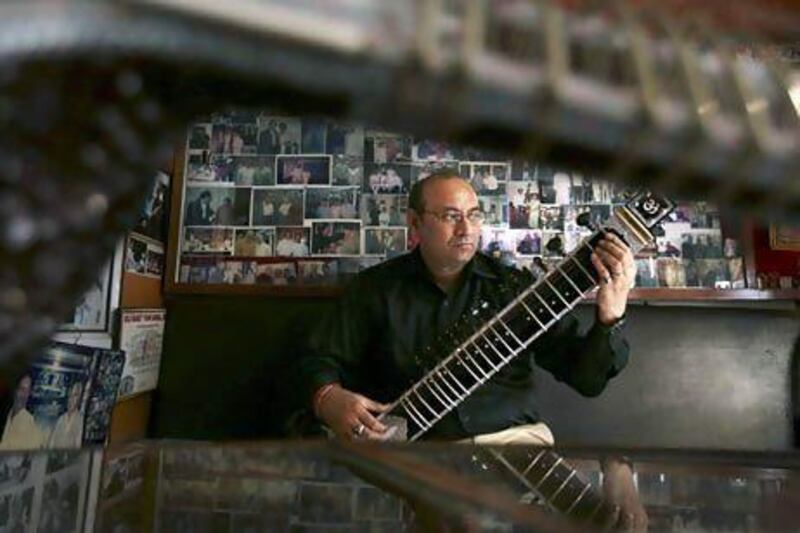NEW DELHI // The walls of Sanjay Sharma's music shop are lined with gleaming string instruments and old photographs of legendary musicians.
Beatles George Harrison, John Lennon and Paul McCartney. Indian classical musicians Zakir Hussain, Shiv Kumar Sharma and Vishwamohan Bhatt. And the man who brought these two very different musical worlds together: Ravi Shankar.
Like his grandfather and father before him, Mr Sharma built, tuned and repaired instruments for the sitar virtuoso, who introduced Westerners to Indian classical music, and through his friendship with Harrison became a mainstay of the 1960s counterculture.
From his tiny shop tucked into the crowded lanes of central Delhi's Bhagat Singh market, Mr Sharma travelled the world with Shankar. Late in the maestro's life, as his health and strength flagged, he even designed a smaller version of the instrument that allowed him to keep playing.
Shankar, who died on Tuesday at the age of 92, was "a saint, an emperor and lord of music", Mr Sharma wrote in a tribute posted on the website of his sought-after shop, Rikhi Ram Music.
"When I opened my eyes there was him", said Mr Sharma, 44, surrounded by display cases full of sitars, sarangis (a stringed instrument played with a violin-like bow), guitars, tabla drums and sarods, a deeply resonating instrument played by plucking the strings.
Shankar "was music and music was him", he said.
Mr Sharma's grandfather started the business in 1920 in the northern city of Lahore, now in Pakistan. He met a young Ravi Shankar at a concert there in the 1940s. Following the India-Pakistan partition and the relocation of the shop to New Delhi, the family began making sitars for Shankar in the 1950s.
By then, the musician was already famous in India and beginning to collaborate with some of the greats of western music, including violinist Yehudi Menuhin and jazz saxophonist John Coltrane.
Then the Beatles visited in 1966 and changed Shankar's life. Mr Sharma's own father had succeeded his grandfather as the supplier of Shankar's sitars. Mr Sharma himself took over in the 1980s.
The bedroom-sized shop has two counters, one for conducting business and one for working on instruments under the beam of a large work lamp. Wood shavings and dust cover the floor of a workshop at the back.As he chatted, Mr Sharma worked on a sitar, peering through his glasses as he used a mallet to hammer in a new fret.
He plucked the strings, and as the sound resonated around the room, he leaned close in to the instrument and listened intently to the vibrations. Satisfied with the results, he moved on to the next fret.
It takes 15 months for a sitar to be ready for use. The actual crafting of the instrument from red cedar and hollowed-out, dried pumpkins takes three months. Then, it is left untouched to go through what is called "Delhi seasoning", in which the extremes of New Delhi's climate - blistering summer, followed by a brief monsoon and a near-freezing, three-month winter - work their magic.
Indian instruments are gradually losing their place in their own country to zippy, electronic Bollywood music.
At the same time, Shankar's work as a global ambassador of music has borne fruit, Mr Sharma says: "Because the music has gone to the West, we're getting lots of new musical aspirants from the western countries."
When jazz pianist Herbie Hancock was in New Delhi a few years ago, he stopped by Mr Sharma's shop to buy a sitar.
And in one of the shop's display windows gleams a newly crafted sitar made of teak. "That," Mr Sharma said, "is for Bill Gates."
* Associated Press





